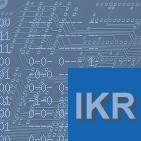 |
|
 |
Institute of Communication Networks and Computer Engineering (IKR)
|
 |
IKR Publication No 36460 |

|
|
 |
 |
 |
|
 |
 |
 |
Publication No 36460
|
|
Author(s)
|
Necker, M.C.*; Weber, A.
|
|
Title
|
Impact of HSDPA Iub Flow Control on System Performance, COST 290 TD(05)047
|
|
Methods
|
Performance Evaluation; Traffic Engineering; Network Planning
|
|
Keywords
|
CDMA; UMTS; FLOW CONTROL; ARQ; SCHEDULING
|
|
Abstract
|
The recently emerging High Speed Downlink Packet Access (HSDPA) enhances conventional WCDMA systems according to the UMTS standard with data rates of up to 14MBit/s in the downlink direction. This is achieved by using adaptive modulation and coding as well as a fast Hybrid Automatic Repeat Request (HARQ) mechanism. This functionality is implemented close to the air interface in the Node B. In addition to the data buffer in the RNC, this requires a second data buffer in the Node~B. Consequently, a flow control mechanism is needed which controls the amount of data to be transmitted from the RNC's buffer to the Node B's buffer. The spatial separation of RNC and Node B imposes significant signaling constraints and control dead time limitations to the flow control mechanism. Additionally, due to the time-varying nature of the radio channel, the data rate towards a particular user may be highly variable. In this paper, we study the impact of the flow control on system performance. We will show that it is essential to jointly consider scheduling and flow control in an HSDPA system as the constraints imposed by the flow control may dominate the system performance.
|
|
Year
|
2005
|
|
Reference entry
|
Necker, M.C.; Weber, A.
Impact of HSDPA Iub Flow Control on System Performance, COST 290 TD(05)047
Proceedings of the 4th COST 290 Management Committee Meeting, Würzburg, October 2005
|
|
BibTex file
|
Download [BIBTEX]
|
|
Full Text
|
No full text available online. To obtain a copy of the publication, please mail to
mail@ikr.uni-stuttgart.de and refer to "Publication number 36460".
|
|
|
Authors marked with an asterisk (*) were IKR staff members at the time the publication has been written.
|
|
|
|
|